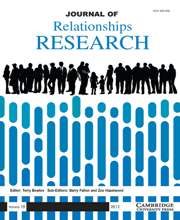Crossref Citations
This article has been cited by the following publications. This list is generated based on data provided by
Crossref.
Jaurequi, Matthew E.
2019.
Adult Attachment and Mindfulness on Mental Health: A Systematic Research Synthesis.
Journal of Relationships Research,
Vol. 10,
Issue. ,
Calleja, Rachel L.
and
Rapee, Ronald M.
2020.
Social threat sensitivity and its relationships with peer victimisation and internalising symptoms among adolescent girls.
Behaviour Research and Therapy,
Vol. 133,
Issue. ,
p.
103710.
Gardner, Alex A.
Zimmer‐Gembeck, Melanie J.
and
Modecki, Kathryn
2020.
A longitudinal model of rejection sensitivity and internalizing symptoms: Testing emotion regulation deficits as a mechanism and outcome of symptoms.
Journal of Personality,
Vol. 88,
Issue. 6,
p.
1045.
Gardner, Alex A.
Zimmer‐Gembeck, Melanie J.
and
Campbell, Shawna M.
2020.
Attachment and emotion regulation: A person‐centred examination and relations with coping with rejection, friendship closeness, and emotional adjustment.
British Journal of Developmental Psychology,
Vol. 38,
Issue. 1,
p.
125.
Zimmer-Gembeck, Melanie J.
Gardner, Alex A.
Hawes, Tanya
Masters, Mitchell R.
Waters, Allison M.
and
Farrell, Lara J.
2021.
Rejection sensitivity and the development of social anxiety symptoms during adolescence: A five-year longitudinal study.
International Journal of Behavioral Development,
Vol. 45,
Issue. 3,
p.
204.
Tuijnman, Anouk
Kleinjan, Marloes
Chen, Shengnan
Engels, Rutger C.M.E.
and
Granic, Isabela
2021.
A Game-based Assessment of the Effects of Rejection on Young Adults.
Proceedings of the ACM on Human-Computer Interaction,
Vol. 5,
Issue. CHI PLAY,
p.
1.
Titova, S.
Zimmer-Gembeck, M. J.
Mendez, N.
Zimmermann, G.
and
Van Petegem, S.
2022.
Adolescent Coping with Peer Exclusion: A Person-Centered Analog Approach.
Journal of Child and Family Studies,
Vol. 31,
Issue. 5,
p.
1290.
Wu, Qinqin
Ran, Guangming
and
Zhang, Qi
2022.
Rejection sensitivity and trait anxiety: The indirect effects of regulatory emotional self-efficacy and shyness.
Current Psychology,
Vol. 41,
Issue. 8,
p.
5481.
MOLDOVAN, Melania
PRODAN, Narcisa
COMAN, Andra D.
and
VISU-PETRA, Laura
2022.
"Deep Dive into the Constructive Mind: Relating Interpretive Diversity Understanding to Anxiety Symptoms and Parental Practices in Middle Childhood".
Journal of Evidence-Based Psychotherapies,
Vol. 22,
Issue. 1,
p.
55.
Bilgin, Ayten
Bondü, Rebecca
and
Elsner, Birgit
2022.
Longitudinal associations between justice sensitivity, nonsuicidal self-injury, substance use, and victimization by peers.
Development and Psychopathology,
Vol. 34,
Issue. 4,
p.
1560.
Dupré, Marie-Pier
and
Véronneau, Marie-Hélène
2023.
Rejet parental et anxiété à l’adolescence : effets modérateurs de la popularité et de l’acceptation par les pairs.
Revue de psychoéducation,
Vol. 52,
Issue. 1,
p.
44.
Tammilehto, Jaakko
Flykt, Marjo
Peltonen, Kirsi
Kuppens, Peter
Bosmans, Guy
and
Lindblom, Jallu
2023.
Roles of recalled parenting experiences and effortful control in adult daily emotion regulation.
Cognition and Emotion,
Vol. 37,
Issue. 4,
p.
795.
Chen, Qiong
Song, Yining
Huang, Yuancheng
and
Li, Caina
2023.
The interactive effects of family violence and peer support on adolescent depressive symptoms: The mediating role of cognitive vulnerabilities.
Journal of Affective Disorders,
Vol. 323,
Issue. ,
p.
524.
Minihan, Savannah
Kwok, Cassandra
and
Schweizer, Susanne
2023.
Social rejection sensitivity and its role in adolescent emotional disorder symptomatology.
Child and Adolescent Psychiatry and Mental Health,
Vol. 17,
Issue. 1,
Polachek, Esther
Gur-Yaish, Nurit
Sher-Censor, Efrat
and
Ziv, Yair
2023.
Associations of mothers’ rejection sensitivity with children’s cognitions about peer rejection and social self-perceptions: The mediating role of maternal supportive behaviors.
Journal of Social and Personal Relationships,
Vol. 40,
Issue. 6,
p.
1792.
Fang, Shichen
Fosco, Gregory M.
and
Feinberg, Mark E.
2023.
Parental warmth and young adult depression: A comparison of enduring effects and revisionist models.
Development and Psychopathology,
p.
1.




